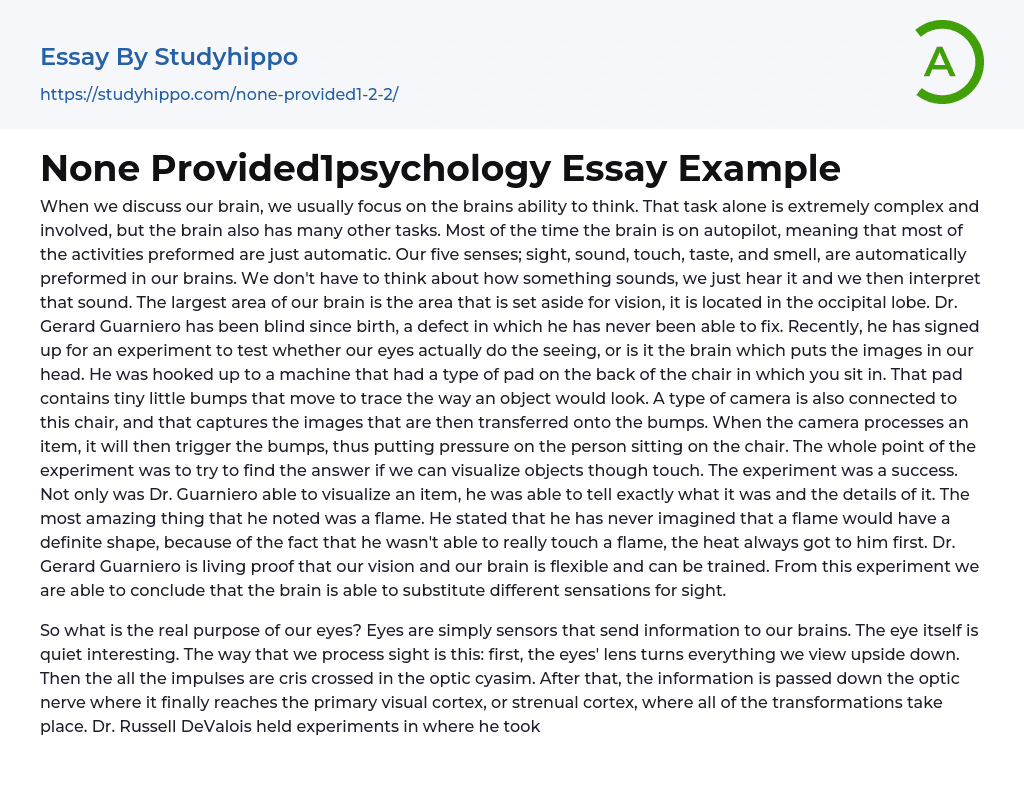When we discuss our brain, we usually focus on the brains ability to think. That task alone is extremely complex and involved, but the brain also has many other tasks. Most of the time the brain is on autopilot, meaning that most of the activities preformed are just automatic. Our five senses; sight, sound, touch, taste, and smell, are automatically preformed in our brains. We don't have to think about how something sounds, we just hear it and we then interpret that sound. The largest area of our brain is the area that is set aside for vision, it is located in the occipital lobe. Dr. Gerard Guarniero has been blind since birth, a defect in which he has never been able to fix. Recently, he has signed up for an experiment
...to test whether our eyes actually do the seeing, or is it the brain which puts the images in our head. He was hooked up to a machine that had a type of pad on the back of the chair in which you sit in. That pad contains tiny little bumps that move to trace the way an object would look. A type of camera is also connected to this chair, and that captures the images that are then transferred onto the bumps. When the camera processes an item, it will then trigger the bumps, thus putting pressure on the person sitting on the chair. The whole point of the experiment was to try to find the answer if we can visualize objects though touch. The experiment was a success. Not only was Dr. Guarniero able to visualize an item, he was abl
to tell exactly what it was and the details of it. The most amazing thing that he noted was a flame. He stated that he has never imagined that a flame would have a definite shape, because of the fact that he wasn't able to really touch a flame, the heat always got to him first. Dr. Gerard Guarniero is living proof that our vision and our brain is flexible and can be trained. From this experiment we are able to conclude that the brain is able to substitute different sensations for sight.
So what is the real purpose of our eyes? Eyes are simply sensors that send information to our brains. The eye itself is quiet interesting. The way that we process sight is this: first, the eyes' lens turns everything we view upside down. Then the all the impulses are cris crossed in the optic cyasim. After that, the information is passed down the optic nerve where it finally reaches the primary visual cortex, or strenual cortex, where all of the transformations take place. Dr. Russell DeValois held experiments in where he took a few monkeys as his subjects, he then showed them pictures, and as he was showing the pictures to the monkeys, he tried to see what the monkeys actually saw in there visual cortex. He has pointed out that there is precision on what our eyes see and what we perceive we see. Dr. David Hubel and Dr. Torsten Wiesel both received awards for there outstanding accomplishments in their study of the primary visual cortex. The primary visual cortex is about the size of a credit card, it lays on
the posterior part of the brain. When cut out, we see that it is a layering structure that has certain loose ends and certain tight ends to it. In the late 1950's, many experiments were tried to see what sort of pictures had an effect on the visual cortex. They were for the most part unsuccessful, until one day, accidentally, they move a glass slid over the projector, and a line appeared one the screen. That line was just what they were looking for. So they classified the visual cortex to be associated with lines, edges, and bars. However, reducing the visual field to bars and lines isn't enough, there are many more different and more complicated tasks to be preformed and to be seen. DeValois stated that some of our visual neurons deal with light rays and the strength of the light rays; however, Hubel disagrees with DeValois on
- Pregnancy essays
- Death essays
- Asthma essays
- Chronic Pain essays
- Diabetes essays
- Infection essays
- Infertility essays
- Pain essays
- Sexually Transmitted Disease essays
- Cholesterol essays
- Epidemic essays
- Pathogen essays
- Symptom essays
- Water supply essays
- Myocardial Infarction essays
- Chronic essays
- Hypertension essays
- Black Death essays
- Breast Cancer essays
- Down Syndrome essays
- Apoptosis essays
- Tuskegee Syphilis Experiment essays
- Type 2 Diabetes essays
- Abnormal Psychology essays
- Social Psychology essays
- Developmental Psychology essays
- Jean Piaget essays
- Positive Psychology essays
- Classical Conditioning essays
- Counseling essays
- Psychoanalysis essays
- Educational Psychology essays
- Behaviorism essays
- Authority essays
- Operant Conditioning essays
- Maslow's Hierarchy Of Needs essays
- Mental Health essays
- Personality Psychology essays
- Psychotherapy essays
- Family Therapy essays
- Stanford Prison Experiment essays
- Abraham Maslow essays
- Erik Erikson essays
- Cognitive Psychology essays
- Sigmund Freud essays
- Attachment Theory essays
- Supersize Me essays
- Individual essays
- Infant essays
- Childhood essays




